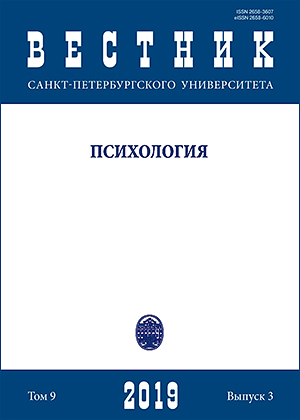Lost possible selves: content and connection with psychological well-being
DOI:
https://doi.org/10.21638/spbu16.2019.306Abstract
This article is intended to cover the major issues of lost possible selves and their relationship with psychological well-being. A brief review of contemporary studies devoted to the phenomenonof lost possible selves was made. The results of an empirical study of the contentand parameters of lost possible selves and their connection with the components of subjective well-being on a sample of online volunteers are presented. The study involved 42 respondents,and the average age was 27 years. Participants filled in a modified questionnaire for studying Possible Selves phenomenon, filled in the E. Diener Life Satisfaction Scale, S. Lubomirski Scale of Subjective Happiness and K. Riff ’s Psychological Well-being questionnaire. It was found thatpeople speaking about their lost possible selves mainly remembered the positive self-images rather than the negative ones. Mostly lost possible selves from the business sphere (study, profession, work) and the sphere of non-professional occupations were mentioned. The negative relationship between the number of actions taken to realize lost possible selves and subjective happiness has been revealed; a negative relationship between the regrets about an unrealized image of self, the frequency of reference to it and self-acceptance has also been revealed. There is a positive relationship between the significance of lost possible selves and positive relationships with others and personal growth; between the ability to realize lost possible selves and personal growth. The results of the study reveal that parameters of lost possible selves — such as significance, actions taken for their realization, frequency of appealing and confidence in the ability to realize them — predict changes of the indicators of the components of psychological well-being. The results also indicate that lost possible selves do not leave people’s lives, but continue to exist, determining the characteristics of their psychological well-being.
Keywords:
possible selves, lost possible selves, subjective well-being
Downloads
References
References
Downloads
Published
How to Cite
Issue
Section
License
Articles of "Vestnik of Saint Petersburg University. Psychology" are open access distributed under the terms of the License Agreement with Saint Petersburg State University, which permits to the authors unrestricted distribution and self-archiving free of charge.




